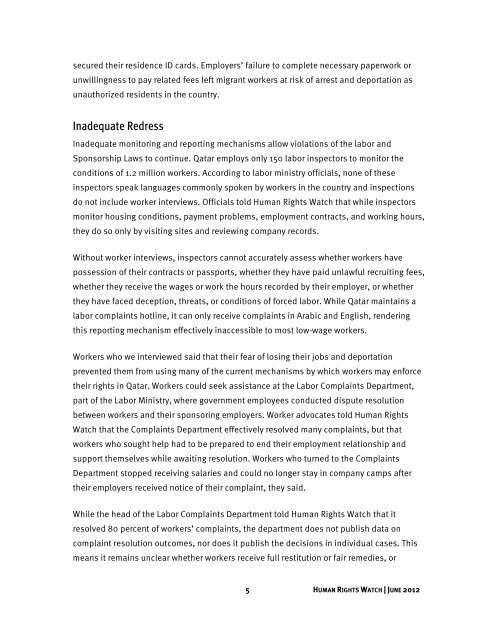Download the full report - Human Rights Watch
Download the full report - Human Rights Watch
Download the full report - Human Rights Watch
Create successful ePaper yourself
Turn your PDF publications into a flip-book with our unique Google optimized e-Paper software.
secured <strong>the</strong>ir residence ID cards. Employers’ failure to complete necessary paperwork or<br />
unwillingness to pay related fees left migrant workers at risk of arrest and deportation as<br />
unauthorized residents in <strong>the</strong> country.<br />
Inadequate Redress<br />
Inadequate monitoring and <strong>report</strong>ing mechanisms allow violations of <strong>the</strong> labor and<br />
Sponsorship Laws to continue. Qatar employs only 150 labor inspectors to monitor <strong>the</strong><br />
conditions of 1.2 million workers. According to labor ministry officials, none of <strong>the</strong>se<br />
inspectors speak languages commonly spoken by workers in <strong>the</strong> country and inspections<br />
do not include worker interviews. Officials told <strong>Human</strong> <strong>Rights</strong> <strong>Watch</strong> that while inspectors<br />
monitor housing conditions, payment problems, employment contracts, and working hours,<br />
<strong>the</strong>y do so only by visiting sites and reviewing company records.<br />
Without worker interviews, inspectors cannot accurately assess whe<strong>the</strong>r workers have<br />
possession of <strong>the</strong>ir contracts or passports, whe<strong>the</strong>r <strong>the</strong>y have paid unlawful recruiting fees,<br />
whe<strong>the</strong>r <strong>the</strong>y receive <strong>the</strong> wages or work <strong>the</strong> hours recorded by <strong>the</strong>ir employer, or whe<strong>the</strong>r<br />
<strong>the</strong>y have faced deception, threats, or conditions of forced labor. While Qatar maintains a<br />
labor complaints hotline, it can only receive complaints in Arabic and English, rendering<br />
this <strong>report</strong>ing mechanism effectively inaccessible to most low-wage workers.<br />
Workers who we interviewed said that <strong>the</strong>ir fear of losing <strong>the</strong>ir jobs and deportation<br />
prevented <strong>the</strong>m from using many of <strong>the</strong> current mechanisms by which workers may enforce<br />
<strong>the</strong>ir rights in Qatar. Workers could seek assistance at <strong>the</strong> Labor Complaints Department,<br />
part of <strong>the</strong> Labor Ministry, where government employees conducted dispute resolution<br />
between workers and <strong>the</strong>ir sponsoring employers. Worker advocates told <strong>Human</strong> <strong>Rights</strong><br />
<strong>Watch</strong> that <strong>the</strong> Complaints Department effectively resolved many complaints, but that<br />
workers who sought help had to be prepared to end <strong>the</strong>ir employment relationship and<br />
support <strong>the</strong>mselves while awaiting resolution. Workers who turned to <strong>the</strong> Complaints<br />
Department stopped receiving salaries and could no longer stay in company camps after<br />
<strong>the</strong>ir employers received notice of <strong>the</strong>ir complaint, <strong>the</strong>y said.<br />
While <strong>the</strong> head of <strong>the</strong> Labor Complaints Department told <strong>Human</strong> <strong>Rights</strong> <strong>Watch</strong> that it<br />
resolved 80 percent of workers’ complaints, <strong>the</strong> department does not publish data on<br />
complaint resolution outcomes, nor does it publish <strong>the</strong> decisions in individual cases. This<br />
means it remains unclear whe<strong>the</strong>r workers receive <strong>full</strong> restitution or fair remedies, or<br />
5 HUMAN RIGHTS WATCH | JUNE 2012

















